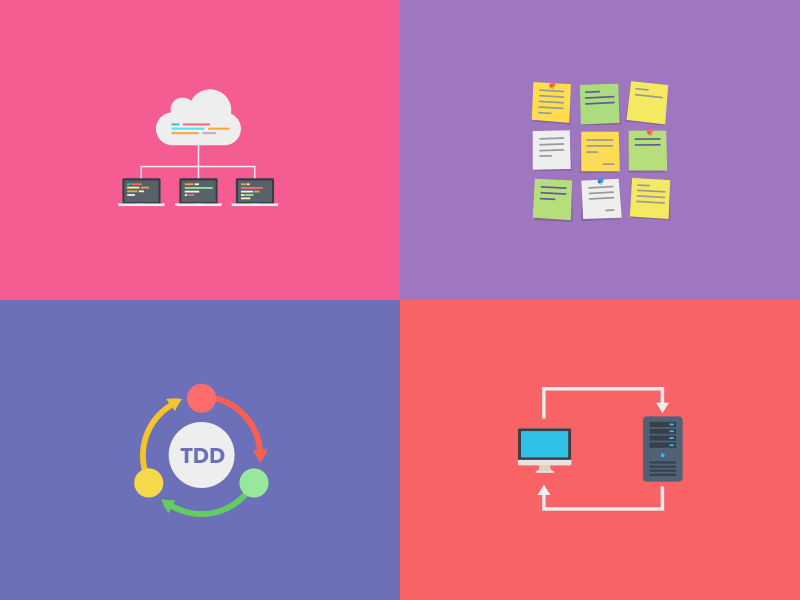“Quantitative economics can get us part of the way towards understanding the world, but if we want to truly understand what sorts of work are socially valuable, we have to be comfortable thinking qualitatively about how individual jobs work, why they exist, and what social value they create.” — Harold Lee on The Future Primaeval
Tag: work
This website was archived on July 21, 2019. It is frozen in time on that date.
Sonya Mann's active website is Sonya, Supposedly.
Simple Versus Easy
Simple things consist of a limited number of intuitively understandable elements. Easy things are, well, easy — they don’t require a lot of effort or education. There is plenty of crossover, but “simple” and “easy” are not the same.

For example, working retail at Walmart is simple. Almost anyone can do it, which is why it’s a low-paid job — there’s no supply constrain of potential employees to drive up the price. (Side note: price =/= value.) However, working retail at Walmart is a hard job. Being in contact with customers all day is emotionally exhausting, especially when you work for an exploitative company that doesn’t mind employee burnout.
It’s not the worst thing in the world when “simple” and “easy” are conflated, but it’s useful to remember why we have two different words and two different underlying ideas. There are plenty of simple tasks that are expensive because they’re difficult to execute.
I considered making this a longer post, but really, there’s no need. It’s a simple thought, after all ;)
Hourly Pay for Creative Work?

There’s a problem with being paid hourly for creative work. Intellectual productivity isn’t based on time, but on quality of output. I don’t know about the rest of you, but I can only think really hard and really well for a couple of hours per day, and usually not longer than thirty minutes at a time.
Concentration consumes a lot of energy, and I need frequent breaks to mess around and do nothing in particular. If I billed for that time, I would feel guilty, because I’m not actually putting words to paper or whatever my client is paying me to do. But I need the breaks to recharge in between creating the work.
I asked a mentor what to do about this problem and she suggested charging a day rate instead. So I guess I should figure that out for the next gig.
Emotional Labor as Comparative Advantage?
Emotional labor means putting up with other people. Enduring them, soothing them, and easing social relationships. This work often defaults to women, and jobs that rely on emotional labor are heavily feminized. Nurses are mostly women. Librarians are mostly women. Preschool and kindergarten teachers are mostly women. Even community and social media managers are frequently ladies.
It’s not true in every instance — for example, plenty of support reps are male — but women are especially likely to volunteer for emotionally weighted work in situations where that labor is unacknowledged. HR, a division characterized by listening to complaints and providing succor, is also predominantly female.

I want to view my socialization in emotional labor as a comparative advantage. If I explicitly call out this work and volunteer for it vocally, can that be a means of gaining professional leverage? The expectation that women perform emotional labor more than their male peers is regarded as insidious in part because it is so often unseen — suppose I refuse to conceal my efforts?
Granted, this is predicated on the idea that I’m good at emotional labor, which is debatable.
Labor-focused feminists have called for women to stop performing emotional labor when it is not adequately compensated or acknowledged, or for men to step up and demonstrate the same sensitivity and patience. Perhaps a third approach is to frame familiarity with emotional labor as a competitive advantage.
Communicating any of this is a challenge, of course. One of the types of social/emotional labor that nearly all of us perform is self-diminishment — straightforward confidence can be viewed as distasteful or even obscene. People use techniques like self-deprecating jokes and affected bashfulness to modulate the appearance of satisfaction with their own work, unconsciously performing a social ritual of modesty.
It’s Okay to Not Learn How to Code
Sometimes — actually quite often — I think to myself, “I should learn how to code.” When I’m feeling particularly peppy, I open up a Khan Academy tutorial. Then after a few minutes I get bored and scroll through Twitter instead. Sure, programming languages are cool and useful, but so is geometry, and I don’t spend my free time on that either.

Here’s the thing: if I were the type of person who would be good at coding, I would have already been playing with Python and Ruby for years. I would have been entranced by HTML in fifth grade — instead of learning the rudiments from Neopets and moving on — and I would have branched out from there.
Realistically, I don’t want to learn how to code. I want the social cachet of being able to build stuff using computers, and I want the high salary a programmer can command in today’s labor market. But there are much easier ways to garner social cachet, ways that exploit my comparative advantage. Maybe I won’t make as much money as the wizards who design APIs and put together apps, but that’s just a function of supply and demand. In other words, it’s a reflection of my skills’ economic value, not a reflection of my value as a human being. Besides, I’ll earn enough.

Even if I forced myself to learn to code, I still wouldn’t be competitively good at it, because I’m not interested. There’s nothing in particular that I want to build that I can’t already hack together using basic OSS or otherwise freely available tools. I have found that it’s impossible to teach myself anything that I’m not enthused by, so why bother trying? There are so many subjects that I do find fascinating — better to focus my energy on those areas instead.
I’m giving myself permission to NOT learn how to code. If something changes and I find myself drawn to it, or if I need more technical capabilities to advance a project, I’ll revisit those Khan Academy tutorials. Either way, ¯\_(ツ)_/¯
Sign up for my newsletter to stay abreast of my new writing and projects.
I am a member of the Amazon Associates program. If you click on an Amazon link from this site and subsequently buy something, I may receive a small commission (at no cost to you).